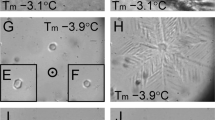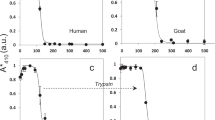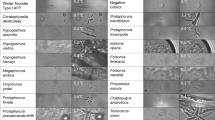Abstract
SCHOLANDER and colleagues1–3 observed that the blood sera of some polar fishes contain a substance of high molecular weight which lowers the freezing point. The general properties and structures of a family of several glycoproteins with this characteristic have recently been described in Antarctic fishes4–14. These “antifreeze” glycoproteins (AFGP) consist of repeating units of the triglycopeptide Ala-Ala-Thr-o-disaccharide. Three active glycoproteins have been characterized; these differ only in polymer length, with molecular weights ranging from 10,500 to 21,000 g mol−1 as determined by ultracentrifugation, light scattering, or osmotic pressure6,11. According to the freezing point depression, however, the apparent molecular weight is only 20 g mol−1, a value equivalent to >500 times the depression calculated from the molecular weights.
This is a preview of subscription content, access via your institution
Access options
Subscribe to this journal
Receive 51 print issues and online access
$199.00 per year
only $3.90 per issue
Buy this article
- Purchase on Springer Link
- Instant access to full article PDF
Prices may be subject to local taxes which are calculated during checkout
Similar content being viewed by others
References
Scholander, P. F., Flagg, W., Walters, V., and Irving, L., Physiol. Zool., 26, 67 (1953).
Scholander, P. F., van Dam, L., Kanwisher, J. W., Hammel, H. T., and Gordon, M. S., J. Cell Comp. Physiol., 49, 5 (1957).
Gordon, M. S., Amdur, B. H., and Scholander, P. F., Biol. Bull., 122, 52 (1962).
De Vries, A. L., and Wohlschlag, D. E., Science, 163, 1073 (1969).
Komatsu, S. K., thesis, Univ. California, Davis (1969).
DeVries, A. L., Komatsu, S. K., and Feeney, R. E., J. Biol. Chem., 245, 2901 (1970).
Komatsu, S. K., DeVries, A. L., and Feeney, R. E., J. Biol. Chem., 245, 2909 (1970).
DeVries, A. L., Vandenheede, J., and Feeney, R. E., J. Biol. Chem., 246, 305 (1971).
Shier, W. T., Lin, Y., and DeVries, A. L., Biochem. Biophys. Acta, 263, 406 (1972).
Vandenheede, J. R., Ahmed, A. I., and Feeney, R. E., J. Biol. Chem., 247, 7885 (1972).
Feeney, R. E., Vandenheede, J., and Osuga, D. T., Naturwissenschaften, 59, 22 (1972).
DeVries, A. L., in Fish Physiology (edit. by Hoar and Randall), 6, 157 (Academic Press, New York, 1969).
Chuba, J. V., Kuhns, W. J., Nigrelli, R. F., Vandenheede, J., Osuga, D. T., and Feeney, R. E., Nature, 242, 342 (1973).
DeVries, A. L., Science, 172, 1152 (1971).
Feeney, R. E., and Allison, R. G., Evolutionary Biochemistry of Proteins (Wiley-Interscience, New York, 1969).
Hargens, A. R., Science, 176, 184 (1972).
Scholander, P. F., and Maggert, J. E., Cryobiology, 8, 371 (1971).
Author information
Authors and Affiliations
Rights and permissions
About this article
Cite this article
FEENEY, R., HOFMANN, R. Depression of Freezing Point by Glycoproteins from an Antarctic Fish. Nature 243, 357–359 (1973). https://doi.org/10.1038/243357a0
Received:
Issue Date:
DOI: https://doi.org/10.1038/243357a0
This article is cited by
-
Calorimetric studies on an insect antifreeze protein ApAFP752 from Anatolica polita
Journal of Thermal Analysis and Calorimetry (2011)
-
Subzero temperature tolerance in spiders: The role of thermal-hysteresis-factors
Journal of Comparative Physiology ? B (1979)
-
Viable embryogenesis of the winter flounder Pseudopleuronectes americanus from - 1.8� to 15�C
Marine Biology (1975)
Comments
By submitting a comment you agree to abide by our Terms and Community Guidelines. If you find something abusive or that does not comply with our terms or guidelines please flag it as inappropriate.



